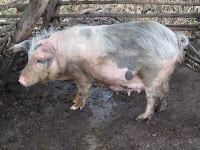I am Basirika Gerald Kisuze aged 17 and Buganda by tribe. For the case of my background, all parents are still alive: Mr. Kakeedo Deo
Ddamba and Namivubo Amyaga from Ttaba trading center Lwendaula village. We were
born seven children including our older sister Nabbuye Fausta, next to her
Nankya Maxersia, followed by myself Kisuze, Kiwamike Vicent, Nakizito Juscent,
Nakaya Melda and our last born Namiiro Victoria. We are only two boys and five
girls. My father was born by a soldier man the late Mark Ddamba who I
didn't get a chance to meet implying the he kicked the bucked when I was not
produced yet.
My father built a house which is not as such permanent as one may think of but it is semi-permanent with evidence from the mud which was used as morter. This house of ours in having five rooms. For a moment all of us children are still alive but our older sister went sick a recently. In the community at large we are poor and my parent Mr. Kakeedo is quite poor although he can slaughter cows every Saturday as his economic activity, plus faming and rearing pigs where he uses some balance of money and pays school fees. My grandmother is still alive for the father and my grandma on my mother's all are alive settled at Ssembabule Mawogola district. Their major activity is coffee growing which is grown on large scale. Our family is not rich although none can say that they are rich. My father has tried his best to educate his children, where my elder sister is at higher school, others are in primary level.
As I am continuing to proceed with my education my goal and ambitions are two. If plan A fails you improvise for plan B. Being a professional doctor is plan A, a professional teacher for a secondary school aiming at teaching chemistry, biology and agriculture is plan B. As far as my performance in those subjects is concerned if God wishes I am able to serve the country's children.
Me there are some challenges I face as I am at school and
in the community as well. The major problem at our school is shortage of laboratory equipments as far as science subjects are concerned comparing to St.
Denis Makondo, and the school buildings do not give enough room for a bright
student to go study because during rainy condition the roofs are
leaking. In the community we are lacking roll models in education who could pursue us to
love education which gives me enough confidence such that I can study to be a
roll model in our family and society. St. Denis Makondo is having well constructed blocks most especially the
computer and main hall block which are good for education compared to ours at Namabaale.
Our buildings are lent to us by the primary school. I am a boarder but in this article I would like to put
across this point that at St. Francis Namabaale we have few teachers, and are affected by jiggers (small insects that bury into the feet) due to dusty classroom blocks. Our school is only five years since
it began and it is still infant.
With my sincere request I would like to
call of the lord to bless you all.





